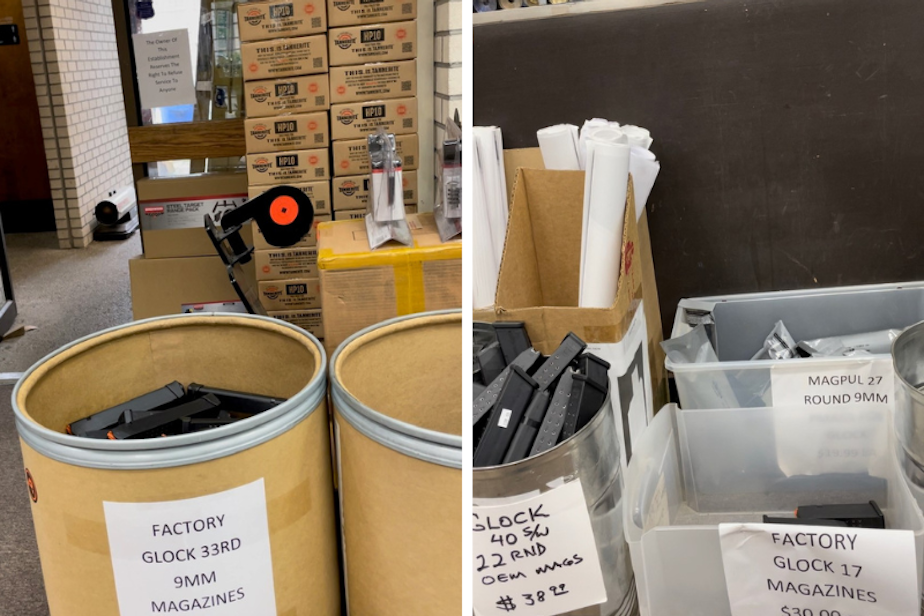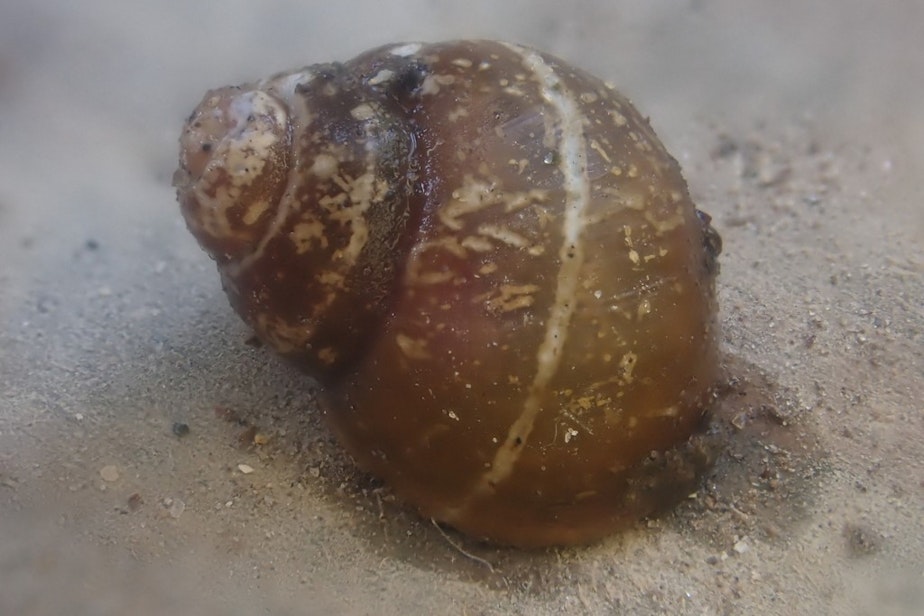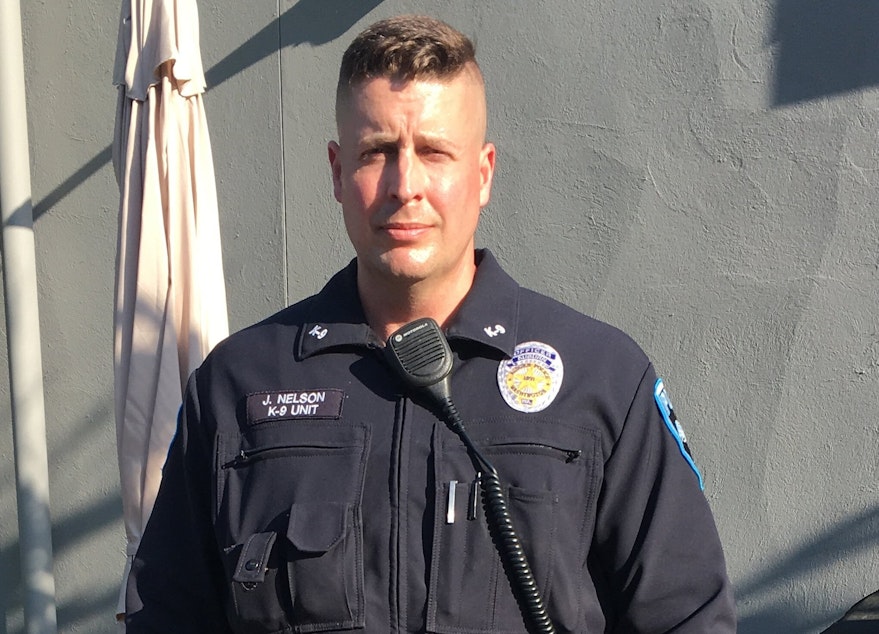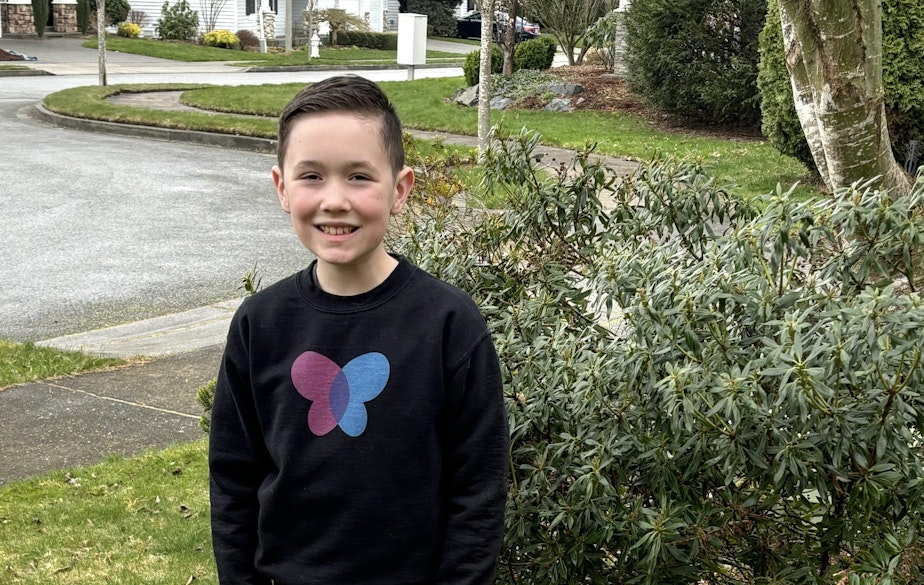

KUOW Blog
News, factoids, and insights from KUOW's newsroom. And maybe some peeks behind the scenes. Check back daily for updates.
Have any leads or feedback for the KUOW Blog? Contact Dyer Oxley at dyer@kuow.org.
Stories
-
Seattle cop accuses Chief Diaz of ‘predatory behavior’ and ‘grooming’
 Four women police officers filed a tort with the City of Seattle on Thursday, alleging sex discrimination and harassment. Counterclockwise from left, Officer Kame Spencer, Officer Valerie Carson, Lt. Lauren Truscott, and Officer Jean Gulpan.Seattle Police Department
Four women police officers filed a tort with the City of Seattle on Thursday, alleging sex discrimination and harassment. Counterclockwise from left, Officer Kame Spencer, Officer Valerie Carson, Lt. Lauren Truscott, and Officer Jean Gulpan.Seattle Police DepartmentThis story was updated to include a statement from Chief Adrian Diaz's personal attorney.
Four female Seattle police officers notified the city on Thursday that they intend to sue for sex discrimination, harassment, and hostile work environment.
The four women are Lt. Lauren Truscott, Officer Valerie Carson, Officer Kame Spencer, and Officer Judinna (Jean) Gulpan. They’re asking for $5 million in damages.
Allegations of harassment extend to the chief. “Chief [Adrian] Diaz seemingly engaged in predatory and discriminatory behavior,” wrote Sumeer Singla, attorney for the four women. Singla is a former assistant city attorney for Seattle, and provided counsel to the police department.
RELATED: 10 female cops speak out about sexism, harassment within the Seattle Police Department
Specifically, Diaz appeared to show interest in Officer Valerie Carson, Singla wrote, beckoning her for long chats at the end of her work shift in public affairs. “Chief Diaz’s practice became a running joke amongst his security detail, because they could not leave either.”
Diaz also commented on Carson’s dresses and high heels, according to the tort, and asked her to drive alone with him on New Year’s Eve 2020. Carson, uncomfortable, asked that his security detail be present.
“Ms. Carson thought it was odd that the SPD chief would want to go out alone with a female patrol officer on one of the busiest and hectic nights in the city without a security detail,” the tort reads. After some persistence, Diaz agreed to bring his detail, the tort says.
The chief also offered to do handy work at Carson’s house. She declined.
Continue reading » -
Seattle's street trees have something to tell you
Taha Ebrahimi pointed to a golden chain tree along a street in Seattle's Georgetown neighborhood. It's the widest of its kind in the entire city. But golden chain trees have slowly disappeared from Seattle over the decades.
“These seeds ... these are actually poisonous," Ebrahimi told KUOW's Paige Browning on an episode of Seattle Now.
RELATED: Seattle passed a tree protection law last year. So why did a 'protected' cedar get the ax?
"In the 1960s, Seattle Children’s Hospital considered golden chain to be the biggest threat to children in Seattle. And now there are only 338 golden chain street trees in the city, probably for that reason.”
Golden chain trees have bright yellow flowers that droop when they bloom. They're among a wide variety of street trees in Seattle — trees planted along sidewalks or at least 10 feet from a curb. They're one of the reasons Seattle is so green. But such trees are more than decoration. Aside from the shade and noise damping benefits they provide, trees tell stories. They hold history. It's a history Ebrahimi says anyone can find sprouting throughout the city.
Street trees of Seattle
Like many did when the pandemic hit in 2020, Ebrahimi started taking neighborhood walks. She’d pass one tree, then another, very different varieties, and started wondering how, and why, they were there.
Luckily, Seattle has an online tree database for such curious minds. It helped, but it has its limits. So Ebrahimi called up Arthur Jacobson, author of “Trees of Seattle” and got him to join her on what became street tree walks.
“Together, we’d be walking and validating this data and it became obvious that a lot of the data was wrong," Ebrahimi said. "We found out about 22% of the city’s data was wrong.”
That put Ebrahimi on a mission: To accurately track Seattle’s street trees. It also added up to her new book, “Street Trees of Seattle.”
Continue reading » -
Washington's high-capacity magazine ban will stay put as court battle continues
Government
 The Washington State Attorney General's Office included these photos in its lawsuit against Gator’s Custom Guns in Kelso, which the AG alleges sold high-capacity magazines after a state ban went into effect.
The Washington State Attorney General's Office included these photos in its lawsuit against Gator’s Custom Guns in Kelso, which the AG alleges sold high-capacity magazines after a state ban went into effect.The sale of high-capacity gun magazines will remain illegal in Washington state while a court fight over the ban continues to play out. That’s according to a decision issued Thursday by Washington state Supreme Court Commissioner Michael Johnston.
The ruling stems from a 2022 state law banning the sale, import or distribution of gun magazines that hold more than 10 rounds.
RELATED: Here's the new plan to boost background checks for guns bought at shows or online
Last fall, Washington’s attorney general sued Gator's Custom Guns, a dealer in Cowlitz County, for what it calls “egregious” violations of the law. The shop allegedly continued to sell high-capacity magazines more than a year after the ban went into effect.
But the gun dealer is pushing back, and says the law is unconstitutional. Cowlitz County Superior Court Judge Gary Bashor agreed with the firearms dealer earlier this month, and struck down the law. Judge Bashor wrote in his opinion that the law violated both the federal and Washington constitutions.
Wally Wentz, the owner of Gator's, told Oregon Public Broadcasting that decision caused "mayhem" in his store as people rushed to buy hundreds of those magazines.
"My wife was handing out bags to people as they came in the door," Wentz told OPB.
But it didn't last long. The state filed an emergency motion to put the law back into place as it appeals that decision.
Hours after Judge Bashor’s ruling, the state Supreme Court issued a temporary stay until the commissioner could take a closer look and hear arguments from both sides.
RELATED: An $8 rifle spurred a change to Washington's background check law. Here's how
Continue reading » -
Sue Bird returns to the Seattle Storm — as an owner
Sports
 Former Seattle Storm guard Sue Bird, in green, stands with her family as her jersey number is lifted into the rafters during a ceremony following a WNBA basketball game between the Storm and the Washington Mystics, Sunday, June 11, 2023, in Seattle.AP Photo/Lindsey Wasson
Former Seattle Storm guard Sue Bird, in green, stands with her family as her jersey number is lifted into the rafters during a ceremony following a WNBA basketball game between the Storm and the Washington Mystics, Sunday, June 11, 2023, in Seattle.AP Photo/Lindsey WassonSeattle Storm superstar Sue Bird is returning to the basketball team, as an owner, less than two years after she retired from the game.
"As a player, I poured my heart into every game for the Seattle Storm, and now, as part of the ownership group, I am thrilled to continue contributing to the growth of the game,” Bird said in a statement.
RELATED: Seattle Storm retires Sue Bird's jersey
“Investing in women’s sports isn’t just about passion; it’s smart business," she said. "It’s about recognizing the immense talent, dedication, and market potential our league has always had. Force 10 Hoops and the Storm have been at the forefront of this for decades. Together, we’re not just shaping the future of basketball, but also paving the way for a more equitable and inclusive society.”
The team is owned by Force 10 Hoops, which announced Bird's arrival to the ownership group Wednesday, April 24.
“We are thrilled to welcome Sue into the ownership group after a storied career on the court,” Seattle Storm co-owner Lisa Brummel said in a statement. “Her knowledge of the game and the league, her ever-expanding business acumen, and her dedication to the Storm organization, make her a superb addition to the ownership group.”
Bird played for the Seattle Storm for more than 20 seasons. In that time, the team won four WNBA championships. Bird represented the USA in the Olympics, earning five gold medals, and she played in 13 All-Star Games. Her jersey number 10 was retired in June 2023.
The Storm's next season begins on May 14.
Continue reading » -
Washington state hospitals are still losing money, leading to 'heartbreaking decisions'
Health Care
 This illustration shows four hands (labeled drugs, energy, salaries, and supplies) reaching out for a jar of money. The jar represents the money available to hospitals, and the hands represent budgetary demands.Illustration by Katie Campbell
This illustration shows four hands (labeled drugs, energy, salaries, and supplies) reaching out for a jar of money. The jar represents the money available to hospitals, and the hands represent budgetary demands.Illustration by Katie CampbellHospitals in Washington state are still losing money, a downward trend that started during the pandemic. And as they try to cut costs, patients are seeing the effects.
“Over the course of the last year, we've seen hospitals make what seem like mundane but also heartbreaking decisions about service reductions and closures,” said Cassie Sauer, the CEO of Washington State Hospital Association. “If you're someone who's looking for care, it can be a really big deal that your hospital now has less capacity.”
RELATED: Financial losses slow for WA hospitals, but concerns remain
Part of the problem is that the cost of providing care has risen because of inflation; the cost of supplies, drugs, and energy have all increased, as have staff salaries. But payments to hospitals from Medicaid and Medicare have stayed the same.
“We have a very expansive Medicaid program,” Sauer said. “The state has not kept pace with paying a reasonable amount for that care.”
The percentage of Washington residents on Medicaid and Medicare is growing, Sauer said, as the state expands its Medicaid program and the population ages.
RELATED: Washington hospitals continue to report financial losses
On top of that, a recent cyberattack cost some of the state’s hospitals millions of dollars.
Another problem for hospitals is the shortage of space at facilities like nursing homes. Because nursing homes in the state are generally already full, patients who are ready to be discharged from hospitals but need ongoing medical care may not be able to leave. Instead, they wait in hospital beds, taking up space that would otherwise go to someone else. Plus, once patients no longer need hospital-level care, the hospital doesn’t get paid for continuing to care for them.
“It’s bad for hospitals and it’s bad for patients,” Sauer said. Hospitals aren’t meant “for a long-term stay. … You don't get to be outside. You don't get to have social time with your friends. You're eating all your meals in the same room.”
RELATED: 50 years ago, many psychiatric hospitals closed. Did that cause today's mental health crisis?
Continue reading » -
Shoreline's secret garden faded into history. The community wants to dig it back up
Who knows how many times Kathleen Lumiere had walked by the dilapidated house in her Shoreline neighborhood before she noticed them? It was on a pandemic-era walk when they could no longer be ignored — plums, peeking over a fence. And they were enticing.
"They were ripe and delicious looking ... and delicious, in fact," Lumiere told KUOW's Seattle Now. "And I was like, ‘Oh, wow. This in an amazing, amazing place.'"
RELATED: What Ciscoe Morris says you should know about spring gardening around Seattle
To the casual observer, the property had long decayed. Paint was chipping off the house with boarded up windows. Blackberry bushes and vines had advanced over the surrounding area. But Lumiere explored and spotted more fruit trees. She found herself returning to the disheveled lot at 16034 Greenwood Avenue North, again and again. There was more than meets the eye to this place.
"It had really, really good soil — my dad was a horticulturist, so I could tell that the soil was amazing," Lumiere said. "It didn't make any sense that an abandoned blackberry patch would have such amazing soil and such vigorous fruit trees. Even though they had been neglected for so long, they were still producing."
It was a mystery to be solved, so Lumiere started asking around, neighbor by neighbor. A story began to take shape, about a once glorious garden, tended to by a locally loved family who not only grew in that soil, they planted themselves in Seattle history. Their life had faded under the tangled weight of blackberry thorns and weeds.
The story became a seed of inspiration for Lumiere, which soon grew and took root with others. It even bloomed in the halls of local government. Now, locals are at the property, clearing, pruning, and cleaning; aiming to return this garden to its former glory.
A Shoreline garden
This wasn't just any home. It was the home of Joe and Jennie Ching. After moving to the area in the 1950s, they spent their life crafting the land, fertilizing it with coffee grounds and kitchen scraps to feed the many organic vegetables they grew. They cultivated fruit trees, spanning Asian pears to figs, apples to persimmon. There was a koi pond and a small bridge. It was constructed as many Asian gardens are, with no straight lines, so visitors could wander along its curves and discover something around each corner.
There were many visitors over the years. Joe had a reputation for taking delight in chatting up passersby and giving them a tour of his home, even strangers. He'd make sure they'd have a bag full of produce when they left. The family even once threw a Hawaiian lūʻau for the entire neighborhood. After a chance drive-by from gardening celebrity Ed Hume, who found the entire site so impressive, the Ching's creation was frequently featured on his TV show "Gardening in America." It wasn't just a garden the Chings were growing — they were digging up warmth and joy to share with Shoreline and beyond.
Continue reading » -
Reporter's Notebook: How the Olympus Rally left me in the dust, and in awe
Arts & Life
 Car 447, driven by Jennifer King and with co-driver Stacy Masters, sends up a trail of dirt and rocks through flying finish at the Olympus Rally's Power Stage on April 21, 2024. The rally drew dozens of volunteers and spectators to the Olympic Peninsula to watch the regional and national competitors.Katie Campbell / KUOW
Car 447, driven by Jennifer King and with co-driver Stacy Masters, sends up a trail of dirt and rocks through flying finish at the Olympus Rally's Power Stage on April 21, 2024. The rally drew dozens of volunteers and spectators to the Olympic Peninsula to watch the regional and national competitors.Katie Campbell / KUOWWhen the "Belltown Hellcat" was caught and charged with reckless driving, I asked my car-enthusiast boyfriend if he knew the guy. That's when I learned a couple things: There are car people who enjoy the sort of high-speed shenanigans that the Hellcat bro tormented Seattle with; and there are car people who are a bit more, shall we say, chill about it.
I got to meet the latter bunch this weekend. I volunteered at the Olympus Rally near Shelton, Wash. It's a two-day rally car race with regional and national stakes. Full disclosure: I don't know a dang thing about rally racing, or cars in general. For folk in the know, this rally is a big deal. It's my boyfriend's favorite weekend of the year.
Now, I get it, y'all.
RELATED: More than 20% of new cars purchased in Washington state are electric
Here's how organizers describe it online: "For over 40 years, we've been hosting a world-class event that sees competitors from around the globe come to race on our twisting long and winding stage roads, some in excess of 20 miles. Join us and experience the rush of adrenaline as drivers compete to be the fastest in the Olympic Forests."
And let me tell you, there was a lot of adrenaline — like when driver Brandon Semenuk, behind the wheel of a very fancy blue and yellow Subaru that swept every stage of the rally, came flying by on the last event of the weekend. I was on the sidelines with the crew waiting to capture his time as Semenuk's car threw up a wave of dirt and rocks.
Continue reading » -
An uncontained tugboat oil spill fouls Seattle waterways
A tug towing a barge out of the Duwamish River toward Ballard polluted local waters this week. The state Department of Ecology says the tug spilled up to 150 gallons of hydraulic oil on Tuesday. A propeller shaft break may have been the cause.
Kersti Muul, a wildlife biologist and urban conservation specialist who lives in West Seattle, reported the spill to the West Seattle Blog. Muul said these kinds of incidents happen too often, and prevention methods should be required by law.
Photos show an oil sheen on the water off Harbor Island and the West Seattle Bridge. A spokesperson for the Department of Ecology said the agency decided to let the oil dissipate on its own because containment efforts were not likely to be effective. Muul called that the lesser of two evils, because booming oil concentrates it, which can lead to more damage.
Ecology officials told KUOW they’re investigating the timeline of the leak and can't say yet when it was stopped. They said the tug’s owner would have a diver inspect the vessel to determine whether it had lost its propeller and shaft, or if there was a different issue.
Muul said that while any spill is unwelcome, the timing of this one coincides with the arrival of multiple migrating birds, including Caspian terns and purple martins. She added that marbled murrelets also like the area, and are on an exponential decline in Washington state.
RELATED: Most of Western Washington's largest Caspian tern colony is dead. Can the seabirds rebound?
The state hotline for reporting a spill is 800-OILS-911.
Continue reading » -
These Northwest snails might need stronger protection than just their tiny shells
Environment
 An ashy pebblesnail, one of two Columbia River basin snails proposed for endangered-species protection by advocates in April.Courtesy Tyson Ehlers/Center for Biological Diversity
An ashy pebblesnail, one of two Columbia River basin snails proposed for endangered-species protection by advocates in April.Courtesy Tyson Ehlers/Center for Biological DiversityEnvironmentalists are urging federal officials to save a pair of Northwest species that you’ve probably never heard of.
If you’ve seen one of them, you might have mistaken it for a pebble on the bottom of a clear-flowing creek.
While salmon get most of the attention, less-charismatic species lose out, too, when Northwest rivers are dammed or damaged.
Two tiny, freshwater snails that thrive in cold, clean, oxygen-rich water have been eliminated from most of the Columbia River Basin, according to the Center for Biological Diversity:
• The ashy pebblesnail. It has pale circles around its tentacled eyes.
• The shortface lanx. It looks like a tiny volcano with its cone-shaped shell.
These tiny snails, less than half an inch tall or wide, still cling to the bottom of a handful of rivers like the Methow in Washington and the Deschutes in Oregon.
The activist group has petitioned the U.S. Fish and Wildlife Service to protect these rare little mollusks.
RELATED: Looking back and looking ahead: the 50-year anniversary of the Endangered Species Act
The shortface lanx is sometimes called the giant Columbia River limpet, though it’s neither giant nor a limpet. It sits on its own branch of the evolutionary tree, being the only species in its genus.
The ashy pebblesnail has no lungs and requires the highly oxygenated environment of clear, cold, flowing water to breathe, as well as a stable, rocky bottom to cling to.
Continue reading » -
Auburn police officer’s murder trial tests new state law for police misconduct
Crime
 Officer Jeffrey Nelson was charged with murder in the second degree, and assault in the first degree, for the death of Jesse Sarey, age 26, in Auburn. Nelson is the first officer in Washington state to be charged under a new law that was passed by initiative, I-940.Auburn Police Department
Officer Jeffrey Nelson was charged with murder in the second degree, and assault in the first degree, for the death of Jesse Sarey, age 26, in Auburn. Nelson is the first officer in Washington state to be charged under a new law that was passed by initiative, I-940.Auburn Police DepartmentThe first police officer charged with murder in Washington under a new legal standard for police misconduct is heading to trial. Jury selection is scheduled to begin April 22 in the trial of Auburn police officer Jeffrey Nelson.
In August 2020, then-King County Prosecutor Dan Satterberg charged Nelson with second-degree murder and first-degree assault for killing 26-year-old Jesse Sarey. Nelson tackled and ultimately shot Sarey while trying to arrest him for disorderly conduct.
Sarey’s former foster mother Elaine Simons said it’s been a long wait to get to this trial date.
“Not only does the Sarey family need resolution but so does Officer Nelson,” she said. “Four years is a long time for everybody.”
RELATED: The silence is maddening: remembering Jesse Sarey
Simons said for her and supporters of the Sarey family, closure would be Nelson’s criminal conviction. Nelson said in his statement about the encounter that he believed Sarey was reaching for the officer’s handgun.
The trial is seen as an important test of Initiative 940, approved by voters in 2018 to remove what was seen as a barrier to prosecuting police for misuse of deadly force.
The law eliminated the requirement to prove “malice” on the part of police officers. Instead prosecutors must convince jurors that deadly force was not reasonable or necessary.
King County Superior Court Judge Nicole Gaines Phelps is hearing the case at the Maleng Regional Justice Center in Kent. It’s expected to last several weeks.
Judge Gaines has already determined that the trial testimony will exclude information about Officer Nelson’s tattoos, which could be read as endorsing police violence, and his previous deadly force encounters. The court has also excluded information about Sarey’s history of drug use and public intoxication.
RELATED: Police training commission moves to decertify Auburn cop charged with murder
Continue reading » -
Chaos and division erupt at Washington Republican convention in Spokane
Elections
 Washington State Republican Chairman Jim Walsh speaks to party delegates at the state GOP convention on April 19, 2024, during a raucous vote to allow consideration of gubernatorial candidate Semi Bird for the party's endorsement.Scott Greenstone
Washington State Republican Chairman Jim Walsh speaks to party delegates at the state GOP convention on April 19, 2024, during a raucous vote to allow consideration of gubernatorial candidate Semi Bird for the party's endorsement.Scott GreenstoneOn Friday, the Washington State Republican Party's convention in Spokane erupted with moments of booing, chanting obscenities, and people turning their backs to the party's own candidates.
Lorraine Blacklock, a precinct committee officer from King County, told the convention she'd never seen anything like this in her 30 years of involvement in the Republican Party.
"Civility has kind of disappeared," she said. "Even in our party, and that's sad."
RELATED: Republicans shrug off anti-LGBT comments from top Washington governor candidate
The convention drew delegates, precinct committee officers, and grassroots activists from across Washington for the weekend. The event is designed to develop the party's platform, choose the party's local leadership, and nominate candidates for statewide offices.
Continue reading » -
Seattle takes a cold plunge to help kids with 'butterfly-like' skin
Health
 8-year-old Patterson McKenzie was diagnosed with epidermolysis bullosa when he was born in 2015.Courtesy of the McKenzie family
8-year-old Patterson McKenzie was diagnosed with epidermolysis bullosa when he was born in 2015.Courtesy of the McKenzie familyOn Sunday, a crowd of Seattleites will brave the cold waters of Alki Beach to increase awareness for the group of genetic skin conditions known as epidermolysis bullosa, which cause painful blistering and tearing. The plunge was organized by the nonprofit EB Research Partnership, which aims to raise $80,000 for research that could help cure and improve treatment for the disorders.
8-year-old Patterson McKenzie was diagnosed with epidermolysis bullosa when he was born in 2015. He said taking a cold plunge and having his condition are both pretty painful, and offered some pointers.
“I breathe heavily in through my mouth a little bit before,” he said.
Annie McKenzie, Patterson's mom, added that they also use distraction methods like singing songs that help guide him and other cold-plungers through the shock. Both of them will be at the beach this weekend, with a playlist featuring Willie Nelson, Pearl Jam, and Marvin Gaye, cheering people on.
“The reason we plunge is to be uncomfortable for a minute, to be in solidarity with kids who have EB who are in pain from birth,” said Jill Vedder, chairwoman of EB Research Partnership, in an organizational meeting earlier this year. “So duck poop is nothing.”
Jill Vedder, along with her husband and Pearl Jam frontman Eddie Vedder, founded the organization in 2010.
The annual cold plunge was started in Massachusetts in 2018 by Emily Kubik and her friends and family, two years after her daughter Elodie was diagnosed with a form of epidermolysis bullosa.
“In some of the dark days in the beginning, which I know so many families have gone through, we were struggling to just keep our heads above water trying to understand what we were dealing with,” Kubik said earlier this year.
They wanted to raise awareness and show Elodie that people cared about her with this plunge, Kubik added. There’s also a fundraising component to the tradition.
“I don’t think in that first year we thought we would raise maybe $30,000, honestly,” Kubik said. “So the fact that just a few years later we’ve raised just over $2 million is really incredible.”
Continue reading »
